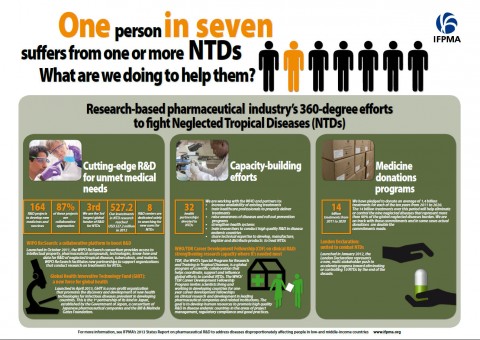IFPMA Statement, WHA 66, Item 16.2, Neglected tropical diseases
Delivered by Mr Mario Ottiglio, Director, Public Affairs and Global Health Policy
Thank you for the opportunity to contribute to this important discussion today. IFPMA represents leading research-based pharmaceutical companies as well as national and regional industry associations across the world
IFPMA highly commends the WHO Secretariat for its efforts and leadership to generate and sustain momentum on neglected tropical diseases. WHO’s continued leadership is fundamental if we want to win the fight against these diseases and improve the lives of people around the world.
Our industry is actively engaged in the fight against neglected tropical diseases (NTDs) by researching and developing medicines for these diseases and increasing access to treatments through medicine donation programs – several of which date back to decades. In the framework of the London Declaration, we announced a major commitment to donate 14 billion treatments by 2020 to control or eliminate nine major NTDs responsible for the 90% of the global burden.
Our industry is today on track with the commitments made in 2012. In the case of schistosomiasis, actual donations made are double the commitment made in past years. According to the recent WHO report on NTDs, increased donations have sped WHO’s ability to delivery of medicines to people in need. In addition, in 2012 some IFPMA member companies joined efforts with partners to develop a new pediatric formulation of praziquantel to combat schistosomiasis.
Looking at the big picture, our industry takes a holistic approach to neglected diseases. In addition to donations, we partner with other stakeholders to strengthen health system capacity and to conduct further research and development to meet unmet needs.
An IFPMA report recently released brings good news. A major increase in pharmaceutical R&D for neglected diseases has occurred, with a 40% increase in the number of R&D programs led by our member companies compared with last year. This significant change brings total R&D projects for neglected diseases to 132, eighty-five percent of which are carried out in Product Development Partnerships.
Addressing NTDs requires commitment of everyone. Medicine donations and further R&D will contribute much, but are not sufficient alone. Improving sanitation, increasing access to safe water, capacity-building and education efforts to reduce disease burden, and investing to reinforce weak and fragmented health systems are all challenges that should be met through engagement of all health stakeholders, particularly governments.
Colleagues, rest assured that we have been engaged on addressing NTDs for a long time and we stand ready to offer our continued support as a partner to see the end of these dreaded diseases.
Thank you.










